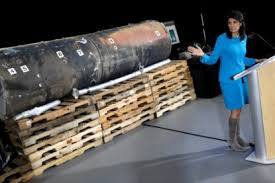How Washington Try to Get Away with Murder in Yemen?
YemenExtra
US Ambassador to the United Nations Nikki Haley should realize that extraordinary claims require extraordinary evidence; that the most confused she will ever get is when she tries to convince her heart and spirit of something her mind knows is a lie.
She needs to realize that what she asserts without evidence can also be dismissed without evidence:
On Thursday, December 14, Ambassador Haley had to put on a brave face to present what she claimed “irrefutable” evidence that a Yemen-fired ballistic on November 30 into Saudi Arabia was Iranian. In a theatrical presentation critics characterized as remarkably similar to former Secretary of State Colin Powell’s false case for the Iraq War, Haley stood before a missile fragment that she claimed bears Iran’s “fingerprints” and asserted that the country poses “a threat to the peace and security of the entire world.”
Per usual, there remains substantial speculation about what, if anything, she actually proved in the presentation. Desperate to cover up for the Saudi war crimes in Yemen with US complicity, Haley pushed the idea that the missile shown, apparently the one fired at the Riyadh airport by Yemeni forces, was provided by Iran, saying the UN had said this was the case. The UN, however, never made any such finding. Likewise, France and many other Western governments were very clear about how skeptical they are of the Haley comments, noting that the UN has not drawn any conclusions themselves, and they are still working with very limited data regarding Haley’s baseless allegations.
This is particularly striking as Haley’s presentation to deceive the world was very light on specifics, and appeared to just echo Saudi Arabia’s own allegations of the missile being from Iran. That the US finds the Saudi narrative convenient is unsurprising, as they failed to regime change Yemen and are desperate to move against Iran on any pretext. With Yemen insisting they made the missile themselves, the lack of evidence to the contrary is going to raise a lot of doubts as well.
However, given new reports that American arms sent to Syrian opposition groups “frequently ended up in the hands” of ISIL fighters, it’s hard to find a conflict or a terrorist group in the Middle East that does not have access to American weapons or Saudi cash. It calls attention to the direct and protracted role the US government has played, and continues to play, in the ongoing war and Yemen’s humanitarian crisis – including all the American and British munitions the Saudis have used on hospitals, schools, markets, funerals, and other civilian objects.
More generally, a substantial majority of UN member states, human rights groups, and relief agencies believe that the Saudis and their partners in crime ought to pay for what they have done to Yemen, including the medieval siege that has throttled the lives of the Yemeni people. For example, Zeid Ra’ad Al Hussein, the High Commissioner for Human Rights, has warned that Saudi Arabia and its allies “could be commissioning international war crimes by killing thousands of civilians in hospitals, markets, schools and even at weddings in Yemen.”
At least 15 relief agencies have equally noted that more people have died because they have been denied access to international medical care than those killed by the fighting. These numbers, they point out, represent the hidden victims of the conflict in Yemen. They say the medieval blockade is “collective punishment for people in Yemen.”
There’s is a simple reason why American politicians don’t mention that the unpopular war they support disproportionately benefits the Military-Industrial Complex – they want to get the policy passed without incurring the wrath of the public. Unfortunately, all reasonable accounts indicate that Ambassador Haley and other US officials are doing just that – they will not surrender their Iran idea when the evidence is against them. To do so, they try to leverage global resentment to extract political gains and to distract the public by talking about anything other than ways in which their policies will benefit them.
So it is unlikely that the US will ever stop its active support for the Saudi war – even if they go against what the world wants. But their baseless allegations about Iran’s role in Yemen cannot give the protracted war a new lease on life. The US-backed, Saudi-led aggressors are not just fighting Yemen, but also the rest of the international civil society. Iran has no role to play in this post-truth madness and reality is far from Haley’s unpopular theatrics.
According to the Iranian media.

